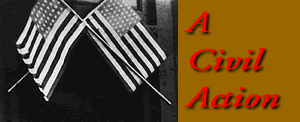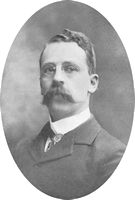
A Civil Action, Part Two: Stranger in a Strange Land
The year-old UW School of Law, by contrast, seemed a bastion of opportunity. It opened its doors on the eve of the 20th century, as University President Frank Graves wrote, "simply to better the opportunities of the young people of the state." The fledgling law school offered to train any qualified man or woman able to come up with the $25 annual tuition. Classes, until 1903, were held near the downtown courts and law offices, a convenience for the practicing lawyers whom founding Dean John Condon often called upon to teach. Though the UW archives yield no pronouncements from Condon on ethnic diversity, the Tyee yearbook approvingly noted the "very cosmopolitan character" of his student population: a black man from Barbados, three women and the Japanese Yamashita alongside "native sons, Germans, Irishmen." What Condon did state, in a speech that foreshadows today's inclusiveness lingo, was that "equality assumes that each can try to do his best, and since the best varies with each individual, political equality should be regarded as a means of permitting these valuable personal inequalities to make their contribution."

From the 1903 Tyee yearbook, founding dean of the UW School of Law John Thomas Condon, who received an undergraduate degree from UW in 1879.
Yamashita's contribution, especially in the moot court, was described in a year-end school wrap-up as "commendable." Just as he had in high school, Yamashita sailed through Condon's rigorous, two-year law curriculum—a program becoming known as hopeless to anyone looking for easy "snap" courses.
For all his academic finesse, Yamashita must have had moments of desolation. Classmates would have seen in his Asian background something, at best, unfamiliar. "A mosaic strange to Occidental eyes" is how a student newspaper reporter described the neighborhood where Yamashita lived while attending the UW, known today as the International District. On these streets, the writer breathlessly found, "a fat Chinaman with his pigtail hanging down" mingled with opium addicts and gamblers. When UW law students were asked to pick a personal yearbook epigram, Yamashita chose "Amicus Alienus" (Friendly Foreigner) and "Stranger in a Strange Land."
But he was on the way to becoming an American. He had to, since Washington required its lawyers to be citizens. Four days before receiving his law degree, he picked up his naturalization papers from the Pierce County Superior Court. The following week, Yamashita rode the train to Olympia with eight classmates to take what in those days was the oral bar exam. He passed with a performance The Seattle Times described as "highly creditable."
Except, as the student newspaper put it, for "a peculiar legal point." The Supreme Court, gatekeeper of the Bar, declared itself in doubt whether a native of Japan was "entitled under the naturalization laws to admission to citizenship."
This doubt dated to one of the earliest acts of Congress, which had offered a shot at citizenship to any "free white person" on American soil. Citizenship was expanded after the Civil War to embrace those of "African nativity or descent." And while an 1882 law specifically excluded the Chinese from the privilege, Congress had never said, specifically, whether someone from Japan was in or out.
Washington State Attorney General W.B. Stratton had no doubts. Yamashita could not become a citizen, he and his two assistant attorneys general wrote, because "in no classification of the human race is a native of Japan treated as belonging to any branch of the white or whitish race."
| On the Web: HistoryLink.org Timeline entry |